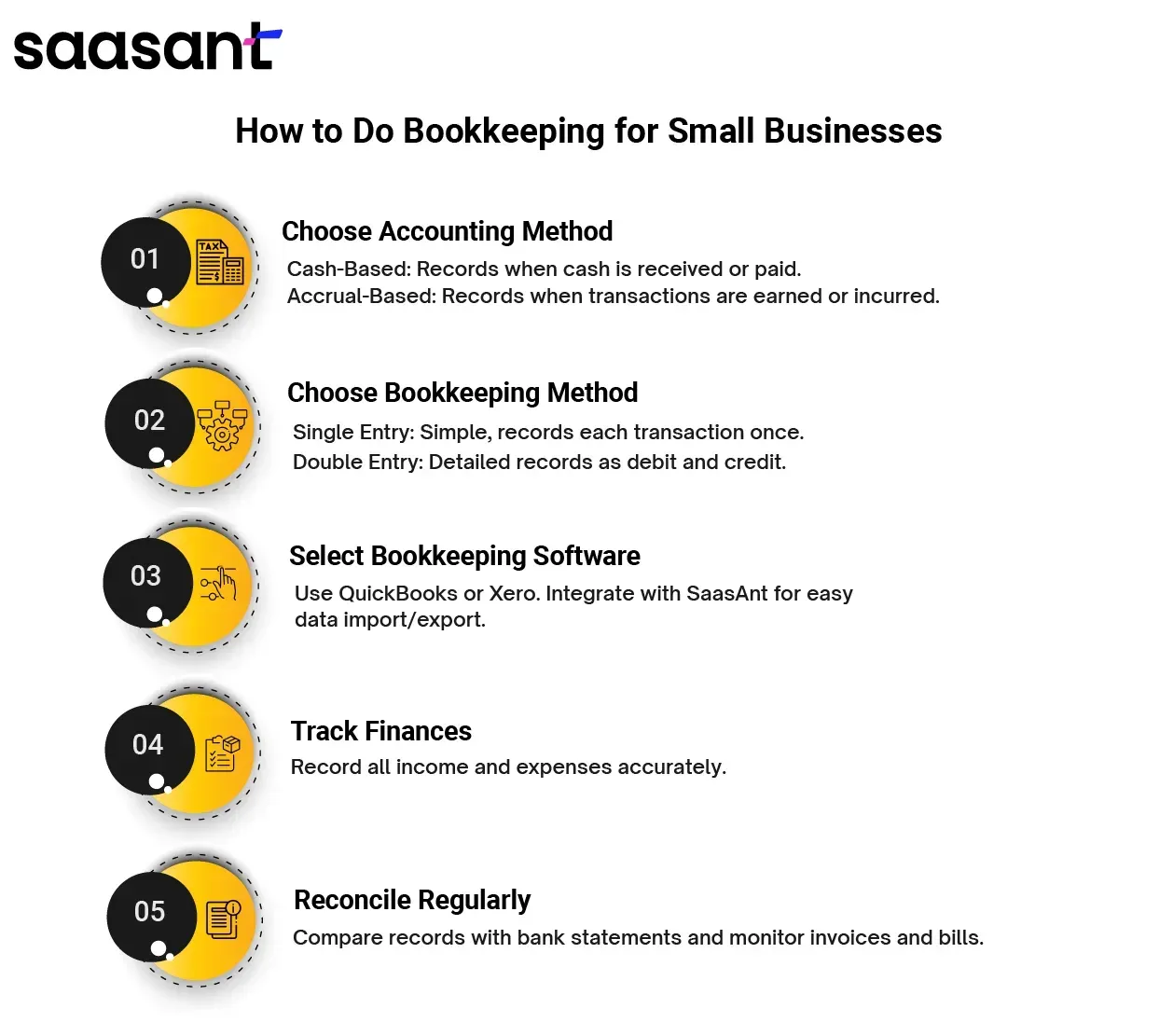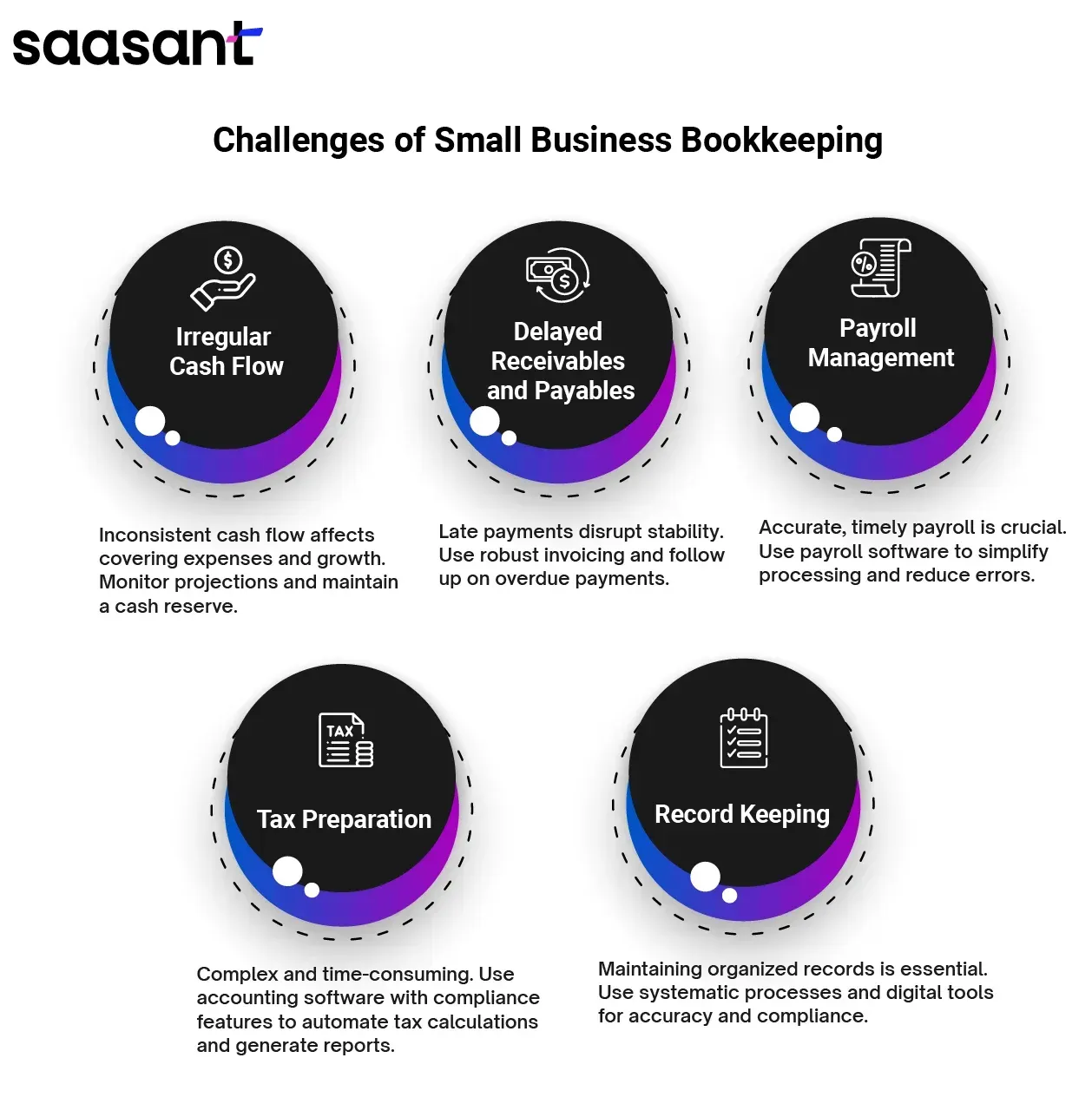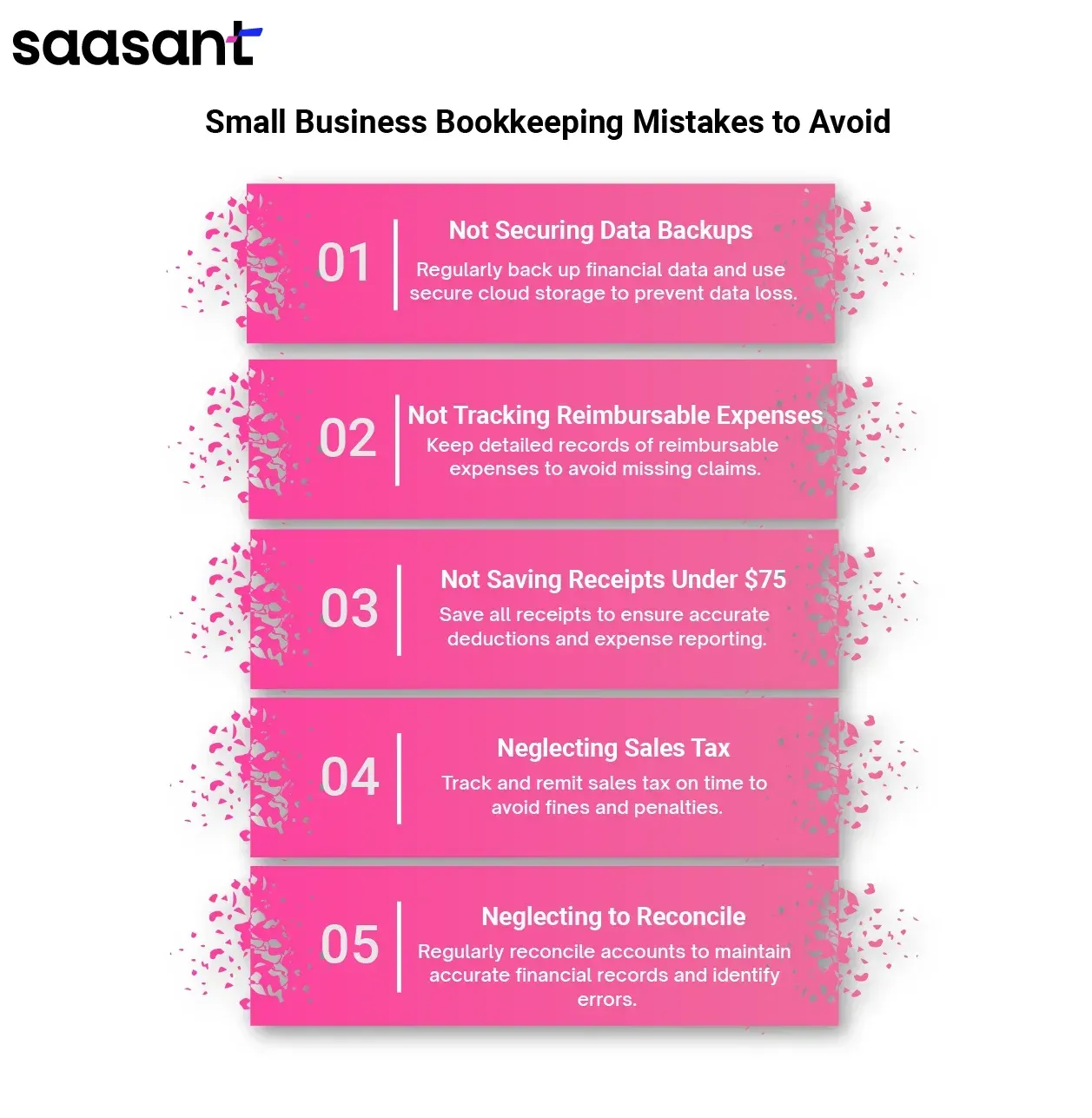Small Business Bookkeeping: Complete Guide for Beginners

Starting a small business involves many tasks, but one of the most crucial is managing your finances. Understanding the basics of small business bookkeeping is essential for growth and success. Accurate bookkeeping practices ensure you maintain a clear record of your cash flow, which is vital for making informed business decisions.
Whether you're looking to handle your bookkeeping or hire a professional bookkeeper, knowing how to get started can save you time and money. This guide will help you navigate the bookkeeping basics for small businesses, ensuring your business stays financially healthy and compliant with regulations.
Contents
What Is Bookkeeping?
Why Do Small Businesses Need Bookkeeping?
How to Do Bookkeeping for Small Business?
What Are Some Challenges of Small Business Bookkeeping?
Tips to Manage Bookkeeping for Small Businesses
Small Business Bookkeeping Mistakes to Avoid
Ready to Get Started with Small Business Bookkeeping?
FAQs
What Is Bookkeeping?
Bookkeeping is the process of recording and organizing a business's financial transactions daily. For small business owners, it ensures that all income and expenses are tracked accurately, providing a clear picture of the business’s financial health. This practice helps make informed decisions, prepare for tax time, and maintain compliance with financial regulations.
There are three main types of bookkeeping statements:
Income Statement: This shows your revenue and expenses over a specific period, helping you understand your profitability.
Balance Sheet: This provides a snapshot of your business's assets, liabilities, and equity at a particular time.
Cash Flow Statement: This tracks cash inflows and outflows, giving insight into your business’s liquidity and cash management.
Why Do Small Businesses Need Bookkeeping?
Bookkeeping for small businesses is crucial for several reasons:
IRS Compliance: Proper bookkeeping ensures that your business complies with IRS regulations. Accurate records of income, expenses, and deductions help in filing taxes correctly and help avoid penalties or audits.
Organized Financial Information: Maintaining detailed records through bookkeeping helps organize financial information. This organized data is essential for analyzing the financial health of your business, tracking cash flow, and making informed decisions.
Facilitates Decision Making: Up-to-date and accurate financial records help small business owners make informed decisions. This includes budgeting, forecasting, setting financial goals, and identifying areas for cost-cutting or investment.
Identifying Mistakes: Regular bookkeeping allows you to spot errors or discrepancies early on, reassuring you. This includes identifying billing mistakes, bank statement discrepancies, or recording transaction errors. Addressing these issues prevents financial inaccuracies from affecting your business operations.
Assessing Financial Health: Bookkeeping provides insights into your business's financial health. When you analyze the bookkeeping statements, you can determine profitability, manage debt, and evaluate liquidity. This demonstrates financial stability to potential investors or lenders.
How to Do Bookkeeping for Small Business?

Choose the proper accounting method
There are two accounting methods. Choose the one that works for your business. Here’s a breakdown of both methods.
Cash-Based Accounting Method: This method records transactions when cash is received or paid. It's more uncomplicated and ideal for small businesses with straightforward transactions.
Accrual-Based Accounting Method: This method records transactions when they are earned or incurred, regardless of when cash is exchanged. It provides a more accurate picture of financial health. Favored by larger businesses or those seeking a comprehensive view of financial health.
Choose a Bookkeeping Method
Here are two small business bookkeeping methods for keeping track of financial records.
Single-entry bookkeeping: It involves recording each transaction once. It's simple, but you may need to provide a complete financial picture.
Double Entry Bookkeeping: Each transaction is recorded twice, as a debit and a credit. This bookkeeping system offers a more accurate and comprehensive view of your finances.
Select a Bookkeeping Software
Choose bookkeeping software that fits your business needs. Popular bookkeeping services include QuickBooks and Xero. Look for features like expense tracking, invoicing, financial reporting, easy integration, multi-user access, flexibility to support multiple businesses, cloud-based solutions, and mobile access. You can integrate QuickBooks and Xero with SaasAnt Transactions, which excels at importing and exporting large volumes of data such as invoices, customers, bills, journal entries, and lists, thus simplifying bulk/batch data transfer and saving time.
Track Income and Expenses
Record all income from sales and other revenue streams. Track all expenses, including rent, utilities, supplies, and payroll. Accurate tracking ensures you have a clear view of your cash flow. Accounting/ bookkeeping automation applications like PayTraQer can help you track your sales, refunds, fees, taxes from e commerce platforms and payment gateways if you are an online seller.
Reconcile and Review Regularly
Reconcile Accounts: Regularly compare your bookkeeping records with bank statements to ensure accuracy.
Review Accounts Receivable and Payable: Monitor outstanding invoices and bills to maintain a healthy cash flow. Ensure timely collection of receivables and payment of payables to avoid financial issues.
What Are Some Challenges of Small Business Bookkeeping?

Irregular Cash Flow:
Managing inconsistent cash flow can be challenging, affecting your ability to cover expenses and invest in growing your business. Keeping a close eye on cash flow projections and maintaining a cash reserve can help mitigate this issue.
Delayed Receivables and Payables:
Late payments from customers and delayed bill payments can disrupt your financial stability. Implementing a robust invoicing system and following up on overdue payments can help manage this challenge.
Payroll Management:
Ensuring accurate and timely payroll processing is crucial. Mismanagement can lead to employee dissatisfaction and legal issues. Using payroll software can simplify this bookkeeping process and reduce errors.
Tax Preparation:
Preparing for taxes can be complex and time-consuming. Using accounting software with compliance features ensures you meet tax obligations and avoid penalties. These applications help automate tax calculations and generate necessary reports.
Record Keeping:
Maintaining organized and accurate records is essential but can be challenging. Incomplete or disorganized records can lead to financial inaccuracies and compliance issues. Implementing a systematic record-keeping process and using digital tools can help keep records up-to-date and accessible.
Tips to Manage Bookkeeping for Small Businesses
This section provides a practical bookkeeping checklist to help small business owners maintain impeccable financial records. These steps keep your bookkeeping on track and enhance financial clarity and compliance.
1. Set a Bookkeeping Schedule:
Establish a regular schedule for bookkeeping tasks. Consistently update your books daily, weekly, or monthly to keep your financial records current and avoid last-minute stress.
2. Keep Personal and Business Expenses Separate:
Maintain a business bank account for business transactions and a separate personal bank account for personal expenses. Categorizing expenses this way simplifies tracking them and ensures accurate financial reporting.
3. Leverage New Technology:
Invest in bookkeeping software to automate tasks, track expenses, and generate financial reports. Allocate a budget for bookkeeping automation applications like SaasAnt Transactions which simplifies bulk data import/export into QuickBooks and Xero and PayTraQer which automates the bookkeeping process of all the e-commerce and payment gateway transactions by syncing the income and expenses into QuickBooks and Xero.
4. Hire a Bookkeeper:
Consider hiring an accountant or professional bookkeeper if your business finances become too complex. A bookkeeper can ensure accuracy, save time, and help you comply with financial regulations.
5. Make Regular Journal and Ledger Entries:
Record all financial transactions in your journal regularly and post them to the appropriate ledgers. Consistent entries help maintain accurate records and provide a clear financial overview.
6. Stay Informed About Tax Liabilities:
Keep up-to-date with tax regulations and deadlines. Understanding your tax obligations and planning can prevent last-minute surprises and ensure compliance.
Small Business Bookkeeping Mistakes to Avoid

Not Securing Data Backups
As a business owner, you need to back up your financial data can result in significant losses if your system crashes or data is compromised. Regularly back up your data and use secure cloud storage solutions to protect your records.
Not Tracking Reimbursable Expenses
You must track reimbursable expenses to avoid claiming these costs, which can impact your cash flow. Keep detailed records of all reimbursable expenses and ensure they are accurately documented and reimbursed.
Not Saving Receipts Under $75
While the IRS may not require receipts for expenses under $75, failing to save them can lead to overlooked deductions and misreported expenses. Keeping all receipts ensures you can substantiate every claim if needed.
Neglecting Sales Tax
Forgetting to track and remit sales tax can lead to hefty fines and penalties. Ensure you understand your sales tax obligations and consistently collect, record, and pay sales tax on time.
Neglecting to Reconcile
Refiling your accounts can lead to discrepancies and inaccurate financial records. Regular reconciliation helps identify and correct errors, ensuring your books are accurate.
Ready to Get Started with Small Business Bookkeeping?
In conclusion, effective bookkeeping is a cornerstone for the success of any small business. Maintaining organized finances reduces stress and improves your decision-making abilities. It creates a sense of control over your business operations and can boost your confidence when making financial commitments or investments.
Bookkeeping complexity can vary depending on your business's size and type. For instance, a retail business will have different financial tracking needs than a service-based business. Maintain bookkeeping practices to address your industry's specific challenges and opportunities.
Whether you manage your finances independently or hire a professional, consistency and attention to detail are essential. Remember, the strength of your financial management directly impacts your business's ability to thrive in a competitive marketplace. Invest in good bookkeeping habits today to secure a prosperous future for your business.
FAQs
What is the easiest way to do bookkeeping for a small business?
The easiest way to do bookkeeping for a small business is to use accounting software like QuickBooks or Xero coupled with SaasAnt Transactions, which automates many tasks and simplifies financial tracking.
Can a small business do their bookkeeping?
Yes, a small business can do their bookkeeping using user-friendly accounting software and following basic bookkeeping principles to manage their financial records.
What is the cost of small business bookkeeping?
Small business bookkeeping costs vary, typically from $200 to $2,500 per month, depending on the complexity and volume of transactions.
What does a bookkeeper do for a small business?
A bookkeeper manages financial records, processes transactions, reconciles accounts, and ensures accurate financial reporting for a small business.
How to do basic bookkeeping for small businesses?
To do basic bookkeeping, record all financial transactions, categorize expenses, reconcile bank statements, and generate financial reports using accounting software.